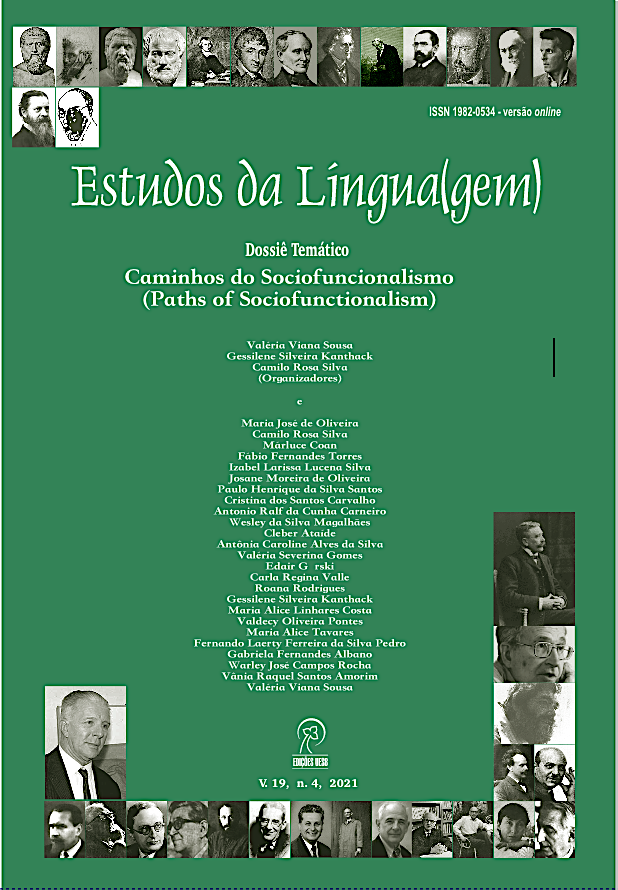A ação do tempo (e dos usuários da língua) sobre o agora (The action of time (and of language users) on the agora [now])
DOI:
https://doi.org/10.22481/el.v19i4.8133Palavras-chave:
Mudança linguística; Frequência de usos; Agora.Resumo
A classificação do item linguístico agora apenas como advérbio de tempo não condiz com a realidade dos usos. Por isso, o objetivo deste trabalho é descrever o comportamento deste elemento, em gêneros textuais distintos, considerando distribuição de frequência e funções sintático-semântico-discursivas. A amostra de dados é estratificada em blocos cronológicos: século XIV a meados do século XVI; meados do século XVI ao século XVII; século XVIII ao século XX. A análise ancora-se em pressupostos (socio)funcionalistas, na convergência de recursos metodológicos quantitativos que visam a uma descrição funcional da língua atrelada a fatores não linguísticos. Estabelecem-se, na revisão de literatura, diálogos com pesquisadores que já se ocuparam de estudar o item (MARTELOTTA, 2004; RISSO, 1998; 2006, entre outros). Com efeito, espera-se que a análise do processo de mudança do agora sob uma abordagem pancrônica constitua contribuição ao processo de descrição da gramática do português.
Downloads
Referências
BAKTHIN, Mikhail. Estética da criação verbal. São Paulo: Martins Fontes, 1992.
DAVIES, Mark; FERREIRA, Michael Ferreira. Corpus do português. 2006. Disponível em: www.corpusdoportugues.org. Data do último acesso: 29/12/2016.
HEINE, Bernard; CLAUDI, Ulrike; HÜNNEMEYER, Friederike. Grammaticalization: a conceptual framework. Chicago/London: University of Chicago Press, 1991.
LOPES, Célia Regina dos Santos et al. Reflexões metodológicas para a análise sociocultural de redatores em corpora históricos. Revista Gragoatá. Niterói, n.29, pp.239-253, 2º sem., 2010.
MARCUSCHI, Luís Antônio. Produção textual, análise de gêneros e compreensão. 2 ed. São Paulo: Parábola, 2008.
MARTELOTTA, Mário Eduardo. Operadores argumentativos e marcadores discursivos. In: VOTRE, Sebastião José; CEZARIO, Maria Maura; MARTELOTTA, Mário Eduardo. Gramaticalização. Rio de Janeiro: Faculdade de Letras: UFRJ, 2004.
OLIVEIRA, Maria José de. Conectores adversativos na fala do natalense: uma análise funcionalista com implicações para o ensino. Dissertação de mestrado. Universidade Federal do Rio Grande do Norte/ UFRN. Natal, 2009.
_____. A multifuncionalidade do item agora através dos séculos: uma análise na fala e na escrita. Tese de Doutorado. Universidade Federal da Paraíba/PROLING. João Pessoa, 2018.
RISSO, Mercedes Sanfelice. “Agora... o que eu acho é o seguinte”: um aspecto da articulação do discurso no português culto falado. In: CASTILHO, Ataliba Teixeira. [Org]. Gramática do português falado. Volume III: As abordagens. Campinas, SP: São Paulo: FAESP, 1998.
______. Marcadores discursivos basicamente sequenciadores. In: JUBRAN, Clélia Cândido Abreu Spinardi; KOCH, Ingedore Grunfeld Villaça [Orgs]. Gramática do português falado no Brasil. Campinas: Unicamp, 2006.
RODRIGUES, Fernanda Costa Demier. Padrões de uso e gramaticalização de agora e então. Tese de doutorado. Pós-Graduação em Letras da Universidade Federal Fluminense. Niterói, 2009.
SCHIFFRIN, Deborah. Discourse Markers. Cambridge: Cambridge University Press. 1987.
Downloads
Publicado
Como Citar
Edição
Seção
Licença
Copyright (c) 2021 Estudos da Língua(gem)

Este trabalho está licenciado sob uma licença Creative Commons Attribution 4.0 International License.
Autores que publicam em Estudos da Língua(gem) concordam com os seguintes termos:
Estudos da Língua(gem) mantém os direitos autorais das contribuições publicadas e disponibiliza seu conteúdo gratuitamente por meio do portal. Autores têm permissão e são estimulados a publicar e distribuir seu trabalho online em repositórios institucionais ou na sua página pessoal, com reconhecimento de autoria e créditos de publicação inicial nesta revista, indicando endereço online.






